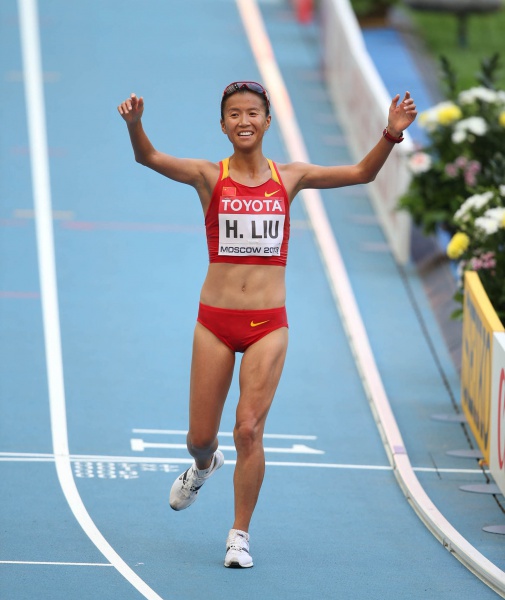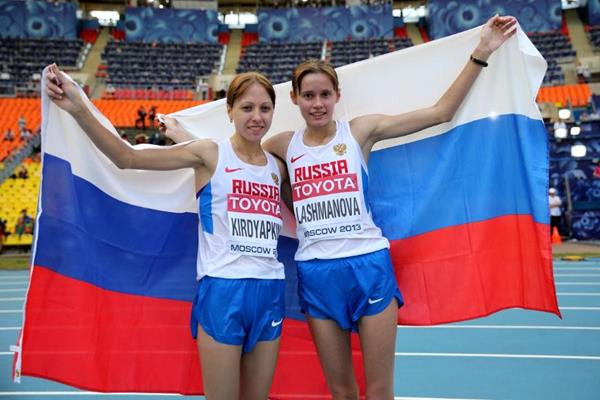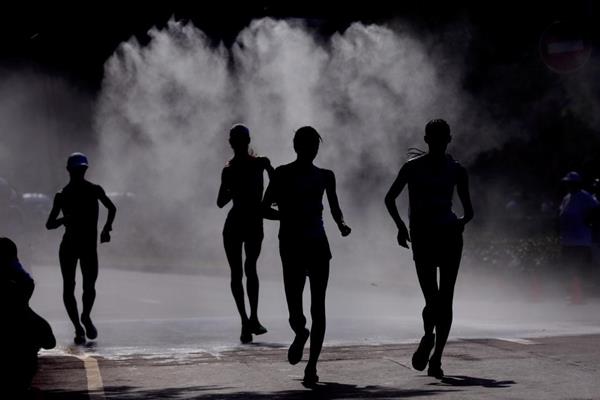20 Km. marcia donne
Partenza alle ore 9:35 locali, con una temperatura di 22° e un'umidità del 57% per le 62 atlete al via.
Favorita d'obbligo la Campionessa Olimpica in carica Elena Lashmanova.
Ieri l'allenatore di due atlete spagnole Julia Takacs e Lorena Luaces, José Antonio Quintana, in un'intervista alla stampa spagnola ha definito le atlete russe e cinesi "di un altro livello e la gara per le medaglie sarà molto complicata", tanto per dare un'idea di come potrà essere questa prova.
Assente Olga Kaniskina, come previsto, presente, invece, Anisya Kirdyapkina sulla quale si erano aperte delle strane voci, poi rimaste infondate, dopo la rinuncia anche del marito Sergey Kirdyapkin alla 50 km.
Entrano nel circuito sulla Moscova dopo 4:00 con in testa Elisa Rigaudo seguita dalla polacca Agnieszka Dygacz e dalle tre spagnole Lorena Luaces, Beatriz Pascual e Julia Takacs.
Le russe nel gruppo. Si fa vedere nelle posizioni di testa anche la ceca Anezka Drahotova che ricordiamo recente vincitrice a Rieti degli Europei Juniores e che alterna le sue esperienze (anche nella stessa giornata) tra la marcia e i 3.000 siepi.
Primo passaggio davanti al tabellone delle squalifica dopo 13:46.
I giudici cominciano a lavorare e tra le prime a vedere le palette gialle davanti agli occhi è proprio Eleonora Anna Giorgi per uno sbloccaggio del ginocchio.
5 Km
Elisa Rigaudo e Anezka Drahotova passano in testa in 23:16.
Il gruppo guidato dalla spagnola Julia Takacs ad una decina di metri, passa con un distacco di 5".
Dopo 33' di gara si mette in testa Anezka Drahotova che forza il passo e guadagna qualche metro su Elisa Rigaudo. Il gruppo è a 15".
Il Km. 9 viene doppiato in 40:57. Poco dopo Elisa riceve una paletta gialla per sospensione.
Si fanno sotto le due russe Anisya Kirdyapkina e Elena Lashmanova che dopo 44 minuti raggiungono la coppia di testa.
Dopo 49' di gara sono in quattro in testa e guida Elisa Rigaudo.
Il distacco sulle inseguitrici guidate da Liu Hong è di 15". Nel gruppetto anche le portoghesi e la guatemalteca Mirna Ortiz e l'altra cinese Sun Huanhuan.
Liu Hong e Sun Huanhuan forzano l'andatura e si portano dietro l'altre russa vera Sokolova. Il distacco dalle prime tende a diminuire. Al 14° km. sempre le quattro in testa con Anezka Drahotova a fare l'andatura, ad una ventina di metri le due cinesi e poi ad un'altra decina Vera Sokolova e Mirna Ortiz.
15 Km.
Il gruppetto di testa passa in 1:02:41 al 15 km
Eleonora Anna Giorgi è gravata da una proposta di squalifica per sbloccaggio del ginocchio.
Le due russe si mettono in testa a fare l'andatura e prendono qualche metro. Elisa Rigaudo sembra soffrire. Si fanno sotto Liu Hong e Sun Huanhuan.
Il cambio di andatura delle russe crea il vuoto, ma Elisa Rigaudo reagisce.
Liu Hong e Sun Huanhuan raggiungono Elisa Rigaudo e Anezka Drahotova.
Sembra, salvo imprevisti terminata la lotta per oro e argento, in quanto le due russe hanno preso un vantaggio di una ventina di metri.
il Km. 16 viene coperto dalle prime in 1:11:03.
Anisya Kirdyapkina si mette in testa a fare l'andatura e la distanza fra le prime due e le inseguitrici aumenta.
Vera Sokolova recupera in una maniera a dir poco incredibile con una azione ai limiti del regolamento e si porta in terza posizione.
Si prospetta una tripletta russa ?
Ultimo giro
Le due russe sono ancora in testa al 18 km con 30" di vantaggio su una inquadrabile Vera Sokolova che è gravata da due red cards.
Allunga allo spugnaggio Elena Lashmanova e forza il passo guadagnando una decina di metri.
Liu Hong stringe i denti e cerca di recuperare su Vera Sokolova; Elisa Rigaudo è qualche metro dopo.
Elena Lashmanova passa al 19 km in 1:23:05 e si invola verso lo stadio.
Entra nello stadio prima la Lashmanova, poi la Kirdyapina.
Succede rocambolescamente di tutto.
La Lashmanova crede di aver terminato la gara al primo passaggio sulla line ad'arrivo e si ferma, viene sollecitata dai giudici a continuare e riprende.
Vera Sokolova viene drammaticamente, ma giustamente e tardivamente, squalifcata in pista.
Vince Elena Lashmanova in 1:27:08 seconda Anisya Kirdyapkina in 1:27:11 e terza Liu Hong in 1:28:10
Quarta l'altra cinese Sun Huanhuan (1:28:32) e quinta Elisa Rigaudo (1:28:41 - Season Best), oggi per la gioia di Sandro Damilano (ancora con l'amaro in bocca per la squalifica di Wang Zhen) che coglie un bronzo e monopolizza quasi i finalisti con tre su otto.
Sesta la sempre bella spagnola Beatriz Pascual (1:29:00) seguita dalla stupenda junior, per coraggio e volontà, Anezka Drahotova (1:29:05 - Personal Best) vera sorpresa della gara e della quale sentiremo certamente parlare in futuro.
Seguono la portoghese Ana Cabecinha (1:29:17) e l'altra spagnola Julia Takacs (1:29:25).
Eleonora Anna Giorgi arriva 10° in 1:30:01 mentre Antonella Palmisano arriva 13° in 1:30:50 (Personal Best).
Delude il bronzo di Mosca 2013 Shenjie Qieyang (CHN - 15° in 1:31:15), mai in gara.
Delle 62 atlete alla partenza, 57 portano a termine la gara.
Quattro le atlete DQ: la già nominata russa Vera Sokolova e prima di lei la guatemalteca Mirna Ortiz (non potranno essere negati i problemi tecnici di questa scuola centroamericana), la messicana Lizbeth Silva e la statunitense Miranda Melville.
Una atleta DNF (la slovacca Maria Galikova).
Nuovi paesi si affacciano alla marcia mondiale: fa piacere vedere al 49° posto Nguyen Thi Thanh Phuc rappresentante del Vietnam che si permette il lusso di lasciare dietro si sè una delle due svizzere che spesso gareggiano dalle nostre parti (Marie Polli) e che mai, prima di oggi si era affacciato ad un Campionato Mondiale: la marcia è veramente diventata universale !
Un piccolo accenno tecnico: delle prime otto che hanno terminato la gara solo una ha avito a suo carico una red card; gli esteti della specialità non potranno non eserne felici.
La marcia italiana femminile, infine, da ampi segni di vitalità, complimenti alle tre azzurre ed ai loro tre allenatori: Sandro Damilano, Gianni Pericelli e Patrizio Parcesepe.
Per Sandro Damilano il "guru" della marcia italiana, tanto vituperato in certi ambienti del bel paese, che oggi incrementa ancora la sua lunga lista di medaglie e che vede una sua atleta storica lottare e piazzarsi con onore, doppia soddisfazione in rosso-azzurro. Complimenti particolari Sandrinho: alla fine quello che conta è il tuo lavoro che ti ha sempre ripagato.
I risultati completi della 20 km. donne: clicca qui
Foto reportage di Giancarlo Colombo e Getty Images: clicca qui

Elena Lashmanova vince davanti a Anisya Kirdyapkina in un caotico finale (by Giancarlo Colombo)

La gioia di Liu Hong per il bronzo

(English version)
20 km. road walk women
(from IAAF web-site by Steve Landells)
In a dramatic and slightly chaotic finale to the Women's 20km Race Walk, Elena Lashmanova led home a Russian one-two to add the World title to the Olympic title she won in London last year.
However, in a state of confusion the 21-year-old, who became the youngest ever winner of this title since it has been held over 20km, believed she had crossed the 'finish line' when she still had another 400m to complete.
Momentarily celebrating her success, she was then told to carry on a further lap of the Luzhniki Stadium, only to make the same mistake again on the top bend. When she final crossed the line 200 metres later, she was relieved to take the race victory – just three seconds clear of her fast-finishing countrywoman Anisya Kirdyapkina, who upgraded to silver on the bronze she won at the last edition in Daegu.
There was also drama in the battle for the bottom rung of the podium after Vera Sokolova was formally disqualified from the race for three technical infringements when entering the stadium. Placed third at the time, the hosts were denied a clean sweep and Liu Hong of China capitalised to take her third successive World Championship medal in 1:28:10, having won bronze in Berlin and silver in Daegu.
The big pre-race news was the non-appearance on the start list of Olga Kaniskina, the World champion for the past three editions. There were rumours that the Russian may not start after a troubled build up to the championships and so it proved.
A 62-strong field set out in the Luzkniki Stadium before leaving the main arena for a series of nine 2km loops adjacent to the Moscow River before they re-entered the stadium for its conclusion.
The early pace was taken up by Italy's 2008 Olympic bronze medallist Elisa Rigaudo, who went through 2km in 9:36. Soon she was joined by the statuesque Czech teenager Anezka Drahotova and the pair had opened up a 20-metre lead on the main pack
Bringing to mind thoughts of Riguado's countrywoman Valeria Straneo, who had employed similar front-running tactics to win the silver medal in the women's Marathon on Saturday, the leader hit the 5km mark in 23:16 with the Czech two metres further back – six seconds clear of the main bunch which contained around 20 athletes.
In the second quarter of the race, the front pair edged out to around ten seconds and it was Drahotova, aged just 18 and a good steeplechaser, who took her turn to set the tempo at the head of affairs.
The European Junior 10,000m race walking champion with a white baseball cap sat backwards on her head opened up a 10-metre lead on Rigaudo with the main pack now a further 15 seconds adrift as 8km was reached by the leader in 36:35. Ines Henriques of Portugal led the following bunch from Spain's Julia Takacs with the Russian and Chinese threat close at hand.
Under a blue sky with some wispy clouds forming, Lashmanova and Kirdyapkina moved ominously towards the front of the chasing pack and quickly set about reeling in the leaders.
At halfway the 18-year-old Drahotova went through in 45:20, one second clear of Riguado. The Russian duo were not now only five seconds off the lead and closing rapidly. Liu of China led a five-strong group now in a single file some 14 seconds behind the leader.
By 11km the shape of the race was now really starting to form. The lead group was now four-strong, as Kirdyapkina and Lashmanova joined the two long-time leaders, although they were initially keen to play the waiting game and let the Czech set the pace.
The next group, some 15 seconds back, also contained four athletes, led by Liu and her compatriot Sun HuanHuan, Mirna Ortiz of Guatemala and Sokolova, the third Russian
By the 13km, Sokolova and Ortiz had dropped off the second group, the latter given a second notification. The gap that the lead pack held on their pursuers had also been reduced to nine seconds as the Chinese pair tried to force their way into the medal race.
Perhaps aware of the growing threat from Liu and Sun, the Russian pair decisively hit the front a little after the 14km. The immediate injection of pace impacted on Riguado and Drahotova as they lost contact and quickly faded out of the gold medal picture.
At three quarter distance it was Lashmanova walking stride for stride with Kirdyapkina in 1:06:52. Six seconds further back were Drahotova and Riguado, who were soon to be caught by Sun and Liu in the battle for bronze.
At 16km – reached in 1:11:03 by the co-leaders – the gap between them and the pursuing pack had been extended to 14 seconds.
Now it was a battle of wills in the race for gold, Kirdyapkina edging a stride clear of Lashmanova.
In the chase group Russian interest was heightened as Sokolova quickly re-emerged into the medal picture, ruthlessly hunting down the Chinese duo and sweeping decisively into the bronze medal position. She quickly, though, earned a second notification from officials to put her under pressure for the remainder of the race.
Just before 18km Lashmanova made her gold medal winning move as she moved quickly to the front for the first time in the race and within 400m had opened up a four-second advantage.
Lashmanova was given thunderous applause as she entered the arena with around 550m to go, however, confusion reigned as she crossed the 'finish line' for the first time believing she had completed the race. She stopped and momentarily celebrated only to be told she needed to walk for a further 400m.
Scenting a possible opening, Kirdyapkina set off in hot pursuit and with 200m remaining had narrowed the gap to around 15m. However, Lashmanova, whose palms were raised in the air as if to signify her confusion entering the home stretch, held on to land gold.
Liu took the bronze – following Sokolova's disqualification – with her compatriot Sun 22 seconds further back in fourth.
Riguado was rewarded for a brave performance with a season's best of 1:28:41 for fifth with the fast-finishing Spaniard Beatriz Pascual sixth in a SB of 1:29.00. Praise should also go to the 18-year-old Drahotova, who looks to be a real talent. She set a personal best of 1:29:05 for seventh.
Steve Landells for the IAAF

Elena Lashmanova and Anisya Kirdyapkina with Russian flags (by Getty Images)

Action shot in women race (by Getty Images)